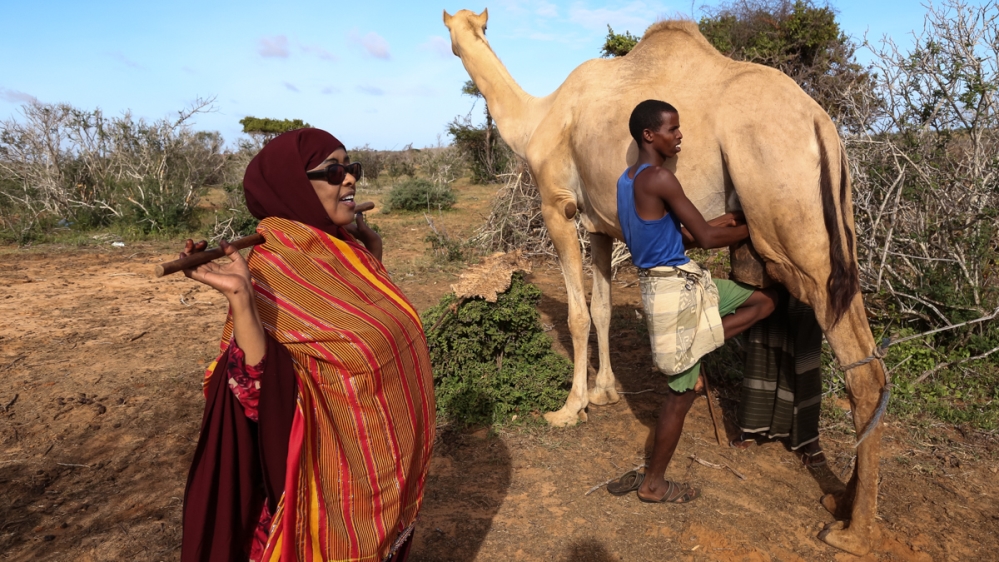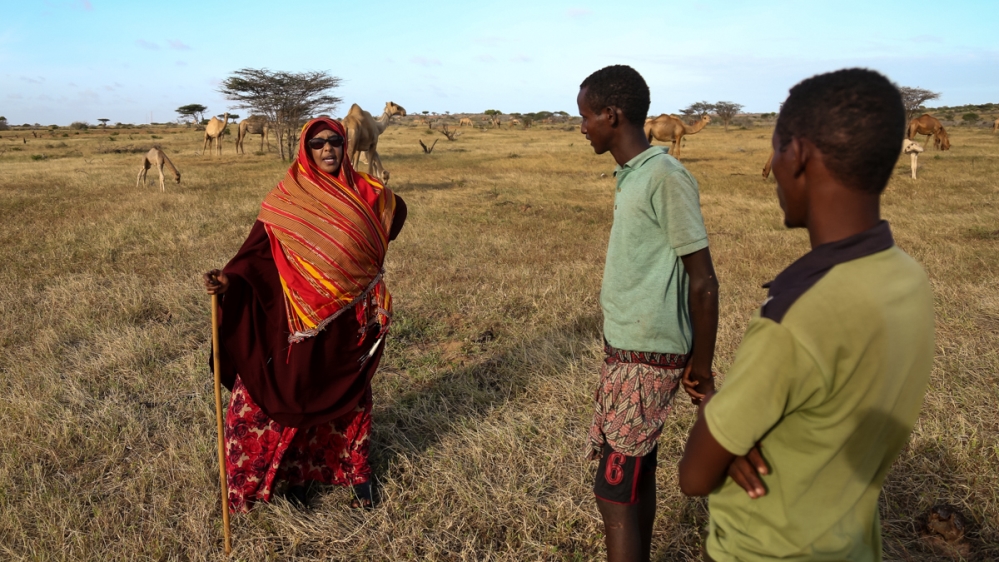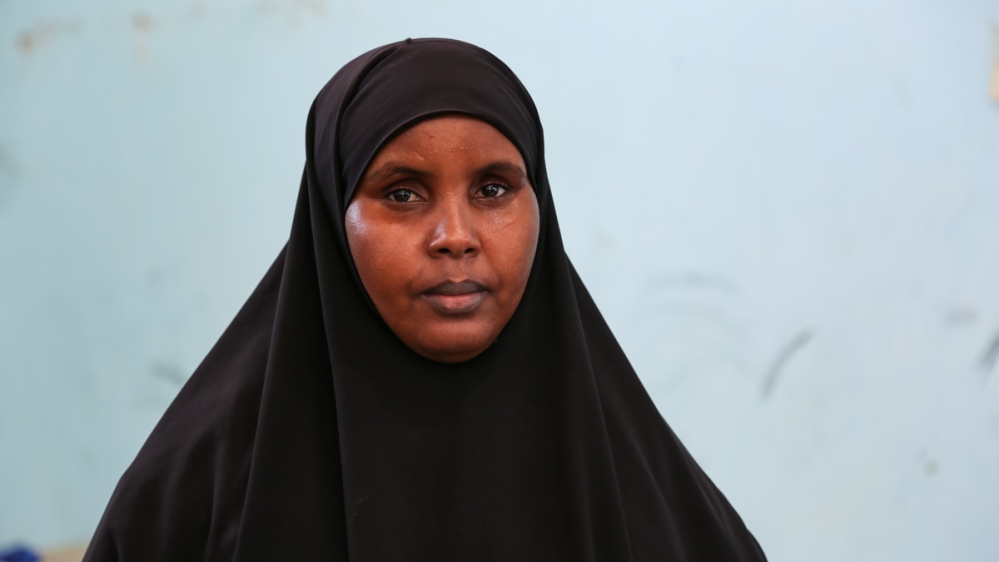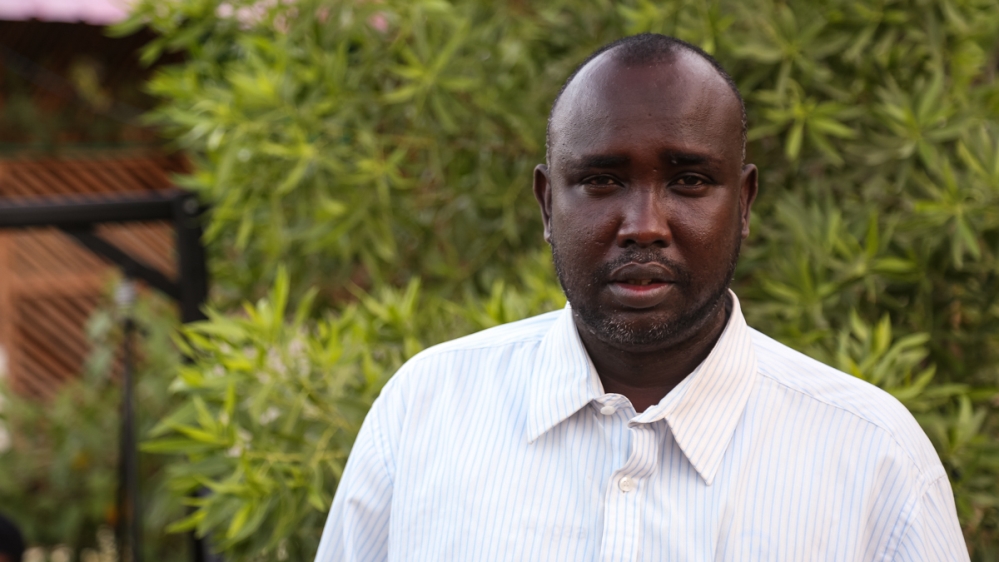Meet Somalia's trailblazing female camel trader.
Zamzam Yusuf, a grandmother of 29, is breaking barriers by entering the once men-only camel trading industry in Somalia.

Zamzam says many people, especially men, laughed at her when she told them she wanted to become a camel trader [Abdishukri Haybe/Al Jazeera]
Kismayo, Somalia - Every morning just before sunrise, Zamzam Yusuf makes the short drive between her house in Kismayo to a farm about 30 kilometres (19 miles) outside the Somali port city.
Tired with life in London where she worked as a carer for more than 10 years, the 55-year-old decided to return home three years ago.
With almost all sectors of Somalia's commerce destroyed due to more than 20 years of civil war, Zamzam spotted an - unlikely - business opportunity and swiftly acted upon it.
"Many thought it was a bad idea. Others laughed at me. My own family advised me against [it] - but it is the best business decision I have ever made," she says.

Zamzam is a camel trader, a job often reserved for men in the conservative country in the Horn of Africa.
Of the world's estimated 35 million camels, Somalia, a country of more than 15 million people, houses more than seven million camels - the highest number per country globally.
Livestock is the backbone of the Somali economy with more than 65 percent of the population engaged in some way in the industry, according to the United Nations Food and Agriculture Organization. But it is extremely rare to see a woman at any of the busy camel markets in the East African country.
"When men found out what I do, they told me it is not a woman's job. That it is too difficult and I should leave it to them," Zamzam, a mother of seven, says.
The industry is lucrative with a fully mature camel costing $1,400 and the young ones going for at least $900. Most of the camels are exported to the Middle East where they command a premium.
The milk, often referred to as white gold, also brings in a decent return. In Kismayo, one litre (33.8 fluid ounces) of camel milk is sold for $1 and Zamzam's herd produces at least 400 litres (105.7 gallons) a day.

The mother of seven employs 10 people and wants to expand her business [Abdishukri Haybe/Al Jazeera]
"First, I started with 30 camels. But slowly the herd has grown. Now the total is 145 camels and growing," she says, as dozens of calves bleat in the background.
"The target is to have more than 1,000 camels. God willing."
In a bid to expand her business, which employs 10 people, Zamzam decided to join forces with two other traders.
"I had no other choice but to have two men as business partners," she says. "I wish more women could join me but that is very difficult. Most women here think it is a job for men."
When she is not busy tending to her herd or dealing with orders, Zamzam spends her time visiting schools and women's workshops where she tries to convince them to give camel trading a chance.

Khadra Abdullahi wants to follow in Zamzam's footsteps despite the advice of some men [Abdishukri Haybe/Al Jazeera]
At Kismayo's Alanley area, Zamzam has found eager listeners among those taking sewing classes at the Awale Womens' Group.
"If a woman can raise children, which everyone agrees is a very tough work, we can easily look after camels," 32-year-old Khadra Abdullahi says.
"Camels are part of our culture and who we are. I want to become like Zamzam. If men can do it we can do it, too. We are strong, too. Some people have the wrong mindset and it is up to us women to prove them wrong." she adds, while other women in the workshop nod in agreement.
But at the city's restaurants and tea stalls, the mood is different. Men are dismissive of the idea of women joining the industry. They know of Zamzam, but in a deeply conservative society where many men believe women should stay at home, they avoid using her name when talking about her.
"My advice for the mother from the diaspora is: Looking after camels is difficult. It brings lots of work and worries. It is not a challenge a woman can handle," Khadar Khalif Hersi, a businessman, says.
"I will strongly advise her to find something else to do and to leave it to us, men. There is a reason why other women are not doing it. She should be like other women," the 40-year-old adds.

Khadar Khalif Hersi thinks women are not strong enough to look after camels
The industry is dominated by men who have never had to compete with a female trader and they find the idea of being challenged by Zamzam unpalatable.
But Zamzam has loyal and vocal support from the young men she has employed.
"I have been working with her for two years. I like [it] and I don't see any problems with her doing this job," Abdullahi Mohamed Aden, one of the camel herders, says.
"It is not against our religion in any way so it is OK. She is a good woman and she is doing something good. Otherwise, I wouldn't be working for her," he adds.
For Zamzam, nothing will stop her from pursuing her chosen career.
"I'm doing this for my grandchildren. I want them to come back to their country and have a good life. Life in Europe is hard and opportunities are few. Somalia has more opportunities for them," the grandmother-of-29 says.
"The men can say what they want. I will not stop. No way," she adds, laughing.
https://www.aljazeera.com/indepth/f...zing-female-camel-trader-190909061933299.html
Zamzam Yusuf, a grandmother of 29, is breaking barriers by entering the once men-only camel trading industry in Somalia.

Zamzam says many people, especially men, laughed at her when she told them she wanted to become a camel trader [Abdishukri Haybe/Al Jazeera]
Kismayo, Somalia - Every morning just before sunrise, Zamzam Yusuf makes the short drive between her house in Kismayo to a farm about 30 kilometres (19 miles) outside the Somali port city.
Tired with life in London where she worked as a carer for more than 10 years, the 55-year-old decided to return home three years ago.
With almost all sectors of Somalia's commerce destroyed due to more than 20 years of civil war, Zamzam spotted an - unlikely - business opportunity and swiftly acted upon it.
"Many thought it was a bad idea. Others laughed at me. My own family advised me against [it] - but it is the best business decision I have ever made," she says.

Zamzam is a camel trader, a job often reserved for men in the conservative country in the Horn of Africa.
Of the world's estimated 35 million camels, Somalia, a country of more than 15 million people, houses more than seven million camels - the highest number per country globally.
Livestock is the backbone of the Somali economy with more than 65 percent of the population engaged in some way in the industry, according to the United Nations Food and Agriculture Organization. But it is extremely rare to see a woman at any of the busy camel markets in the East African country.
"When men found out what I do, they told me it is not a woman's job. That it is too difficult and I should leave it to them," Zamzam, a mother of seven, says.
The industry is lucrative with a fully mature camel costing $1,400 and the young ones going for at least $900. Most of the camels are exported to the Middle East where they command a premium.
The milk, often referred to as white gold, also brings in a decent return. In Kismayo, one litre (33.8 fluid ounces) of camel milk is sold for $1 and Zamzam's herd produces at least 400 litres (105.7 gallons) a day.

The mother of seven employs 10 people and wants to expand her business [Abdishukri Haybe/Al Jazeera]
"First, I started with 30 camels. But slowly the herd has grown. Now the total is 145 camels and growing," she says, as dozens of calves bleat in the background.
"The target is to have more than 1,000 camels. God willing."
In a bid to expand her business, which employs 10 people, Zamzam decided to join forces with two other traders.
"I had no other choice but to have two men as business partners," she says. "I wish more women could join me but that is very difficult. Most women here think it is a job for men."
When she is not busy tending to her herd or dealing with orders, Zamzam spends her time visiting schools and women's workshops where she tries to convince them to give camel trading a chance.

Khadra Abdullahi wants to follow in Zamzam's footsteps despite the advice of some men [Abdishukri Haybe/Al Jazeera]
At Kismayo's Alanley area, Zamzam has found eager listeners among those taking sewing classes at the Awale Womens' Group.
"If a woman can raise children, which everyone agrees is a very tough work, we can easily look after camels," 32-year-old Khadra Abdullahi says.
"Camels are part of our culture and who we are. I want to become like Zamzam. If men can do it we can do it, too. We are strong, too. Some people have the wrong mindset and it is up to us women to prove them wrong." she adds, while other women in the workshop nod in agreement.
But at the city's restaurants and tea stalls, the mood is different. Men are dismissive of the idea of women joining the industry. They know of Zamzam, but in a deeply conservative society where many men believe women should stay at home, they avoid using her name when talking about her.
"My advice for the mother from the diaspora is: Looking after camels is difficult. It brings lots of work and worries. It is not a challenge a woman can handle," Khadar Khalif Hersi, a businessman, says.
"I will strongly advise her to find something else to do and to leave it to us, men. There is a reason why other women are not doing it. She should be like other women," the 40-year-old adds.

Khadar Khalif Hersi thinks women are not strong enough to look after camels
The industry is dominated by men who have never had to compete with a female trader and they find the idea of being challenged by Zamzam unpalatable.
But Zamzam has loyal and vocal support from the young men she has employed.
"I have been working with her for two years. I like [it] and I don't see any problems with her doing this job," Abdullahi Mohamed Aden, one of the camel herders, says.
"It is not against our religion in any way so it is OK. She is a good woman and she is doing something good. Otherwise, I wouldn't be working for her," he adds.
For Zamzam, nothing will stop her from pursuing her chosen career.
"I'm doing this for my grandchildren. I want them to come back to their country and have a good life. Life in Europe is hard and opportunities are few. Somalia has more opportunities for them," the grandmother-of-29 says.
"The men can say what they want. I will not stop. No way," she adds, laughing.
https://www.aljazeera.com/indepth/f...zing-female-camel-trader-190909061933299.html
Last edited:





